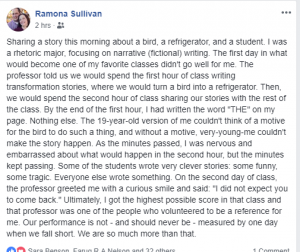 We get this question a lot.
We get this question a lot.
The answer is: yes.
Which is to say: to answer that question, you have to ask some others.
What do I want out of an internship?
- If your goal is simply to start getting some work experience because you have none and to start exploring what’s out there, then any time is a good time to apply. An unpaid internship can be a good place to start building your skills and network.
- If you are hoping to land an internship with a company that will hire you after graduation, then you should definitely plan on doing a paid summer corporate internship between your junior and senior year (and you should plan to go to the fall career fairs to explore your options, even if you’re a freshman or sophomore).
- If your goal is to get experience in a specific industry (like museum work or publishing or event planning), then follow the opportunities as they arise — and be aware that an internship is not your only path to experience. A paid job or volunteer position might be equally relevant.
Do I have time for an internship?
You should only accept an internship, whether paid or unpaid, if you can devote the time and attention it deserves — so trying to do an internship during a semester when you know you’ll be swamped with other commitments is probably a bad idea. Be aware, however, that the time commitment for an internship can range from 3 hours/week to 20 hours a week — so much may depend on the particular internship you have in mind. A paid internship can take the place of a paying job, and some unpaid internships can offer the same rewards that you get from volunteer activities — so keep in mind your own big picture.
What can I expect to get out of an internship?
Some internships can lead directly to post-graduate employment, but many do not. Some of the other benefits of an internship can be
- (in some cases), a wage or stipend
- references and networking contacts to help you on your next steps towards a career
- greater knowledge of the strengths you bring to a team or organization
- insight into the kinds of work settings where you thrive
- first-hand knowledge of what a particular line of work is like, day-to-day
- relevant experiences to talk about in an interview
- recognition of the kinds of work settings and conditions that you don’t want — negative experience is still experience.
Am I qualified to apply for interesting internships?
Probably. In many cases, enthusiasm for the job is a relevant qualification. Customize a resume that highlights any relevant experience you have and write a compelling cover letter or email that conveys your interest in the position. (Pro-tip: most employers are not interested in what they will do for you in advancing your career — they want to know what you can do for them.) In any event, why NOT apply? if you aren’t qualified, the employer will decide that for themselves — you don’t get extra credit for ruling yourself out ahead of time.
But…I’m just a freshman (sophomore, junior, senior….). Is NOW the right time? Is it too soon? Too late?
Some employers only want sophomore or juniors; many don’t state a preference. Some freshman find an internship as soon as they get to campus, others prefer to wait until they’ve gotten used to college life. Some students never hold an internship but find post-graduate employment on the basis of other kinds of experience. There’s no right time. There’s no wrong time. There’s just your time, which you should use in the ways that work for you.
 We’ve added a page to this site dedicated to Alternative Pathways to Teaching. English majors can get a minor in secondary education, which certifies them to teach middle or high school in Illinois. However, not everyone discovers their desire to teach in a timeframe that accommodates that program, and some people are curious about teaching but unwilling to commit to a time-intensive minor. There are other ways to embark on a teaching career, and Alamgir Hossain has gathered them into a single resource for you.
We’ve added a page to this site dedicated to Alternative Pathways to Teaching. English majors can get a minor in secondary education, which certifies them to teach middle or high school in Illinois. However, not everyone discovers their desire to teach in a timeframe that accommodates that program, and some people are curious about teaching but unwilling to commit to a time-intensive minor. There are other ways to embark on a teaching career, and Alamgir Hossain has gathered them into a single resource for you.


 We get this question a lot.
We get this question a lot. It’s the time of year when you’re getting bombarded with information about internship opportunities. Here are a few things to know:
It’s the time of year when you’re getting bombarded with information about internship opportunities. Here are a few things to know: